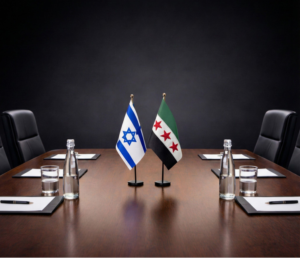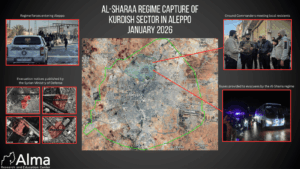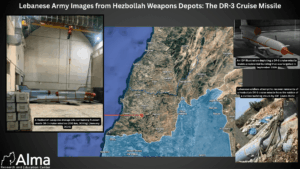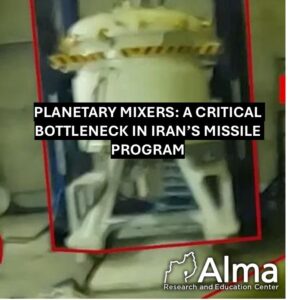By: Tal Beeri and Dr. Zoe Levornik.
On July 7th, Lebanese President Joseph Aoun delivered Lebanon’s official response to the American envoy, Thomas Barrack, regarding the U.S. demands document, which primarily focused on the issue of disarming Hezbollah.
Following his meeting with the Lebanese president, Barrack stated that a sense of hope and opportunity had emerged for Lebanon, and that the country should adapt, without coercion, to the changes occurring in the region. Barrack added that if Lebanon chooses to adapt, it will receive full support and assistance. He emphasized that Israel seeks peace with Lebanon, not war.

As talks on disarmament are ongoing, Hezbollah has recently launched a new propaganda campaign under the slogan “We Will Not Give Up Our Weapons.” The goal of the campaign is to underscore the importance of maintaining its military arsenal, even in the face of internal and international political pressure.
As part of the campaign, Hezbollah has employed unconventional visual tools, such as animated cartoons that convey ideological messages. These include imagery like a rifle planted in the ground as a tree from which protection grows, or weapons shielding the Lebanese family.
In this “soft” campaign, designed to reinforce the narrative that Hezbollah is the “Defender of Lebanon,” the organization incorporated public processions marking Ashura with the distribution of sweets, fruits, and food items to the general public. The packaging was labeled with satirical slogans that blend mockery with defiance, such as: “No weapons? Come try the sweets” or “No weapons? Take a melon.”
Through this approach, Hezbollah aims to project self-confidence while criticizing its opponents. The choice to use appealing gifts, symbols of hospitality and closeness, serves as a provocative gesture in response to the demand for Hezbollah’s disarmament: You won’t get our weapons, but at least you’ll get some candy… or other goodies.

Senior Hezbollah officials, led by the organization’s leader, Naim Qassem, continue to emphasize that there is nothing to discuss regarding the disarmament issue as long as “Israeli occupation and aggression persist” and as long as Israel does not release Lebanese prisoners. Qassem repeatedly stresses that Hezbollah will only be willing to discuss Lebanon’s “defense strategy” after Israel fulfills its part of the ceasefire agreement. He stated that Hezbollah’s missile arsenal is the “foundation of the organization’s defense”, thereby effectively rejecting demands for Hezbollah to relinquish its weaponry.
In our assessment, the term “defense strategy” essentially serves as a euphemism for rejecting the idea of disarmament. Hezbollah’s long-standing narrative that it is the “Defender of Lebanon” aligns neatly with this new terminology.
According to various unverified reports, Iran has expressed strong dissatisfaction with any attempt to disarm Hezbollah.
Should the Focus Be Solely on the Issue of Disarmament?
In our understanding, there is minimal attention being given to the factors that enable Hezbollah’s military activity and armament.
It appears that ongoing resolution efforts largely ignore the social and civilian infrastructure of Hezbollah, which, in effect, is what enables all of its military operations. If this infrastructure is not disrupted, Hezbollah will continue to function as a state within a state. This refers to the Executive Council, and in particular, its financial and educational arms.
Hezbollah’s bank, Al-Qard al-Hassan, provides the organization with economic independence and control, essential for the rebuilding of its capabilities. Hezbollah also operates an independent education network, parallel to Lebanon’s official education system, which serves to indoctrinate the Shiite base and ensures continued loyalty and support for the organization. In the fields of food, healthcare, fuel, and energy, Hezbollah is the main provider of services to its support base. This entrenched welfare system fosters public dependency and secures broad support, thereby enabling Hezbollah to regroup and grow stronger.
Furthermore, despite the setbacks Hezbollah has suffered due to the war, it continues to maintain political dominance at both local and electoral levels. A focus solely on the weapons issue is overly narrow and creates a false dichotomy between Hezbollah’s military and civilian structures. As Hezbollah itself has repeatedly declared, it is one unified organization, with its military and civilian infrastructures tightly intertwined.
Therefore, addressing the Hezbollah threat requires a more comprehensive and in-depth approach, one that also aims to prevent the organization’s civilian resurgence and reconstruction. (See our article on the subject published on July 8.)
Positions of Lebanon’s Senior Leadership
President of Lebanon – Joseph Aoun
President Joseph Aoun continues to emphasize his commitment to centralizing all weapons under state control. In a recent interview, he stated that “in Lebanon, weapons should only be in the hands of the army.” However, he clarified that disarming Hezbollah must be achieved through dialogue, not coercion, in order to prevent escalation into internal conflict. Aoun called on the United States to pressure Israel to withdraw from positions it still holds in the South, to release Lebanese prisoners, and to cease violations – conditions he believes would facilitate the disarmament process.
Prime Minister of Lebanon – Nawaf Salam
Prime Minister Nawaf Salam declared that the Lebanese Army has dismantled more than 500 Hezbollah military sites and weapons caches south of the Litani River since the end of the war (note: there is no open-source evidence to confirm this claim). He reaffirmed his government’s commitment to implementing UN Security Council Resolution 1701, but stressed that true security cannot be achieved while Israel continues to hold occupied territories and violate Lebanese sovereignty. Salam added that all weapons must be in the hands of the state, and acknowledged that Lebanon has failed to implement this provision of the Taif Agreement.
Speaker of the Lebanese Parliament – Nabih Berri
Nabih Berri, who is closely aligned with Hezbollah, adopts a cautious stance. Although discussions have taken place between him and President Aoun regarding consolidating weapons under state authority, he has previously stated that “no one accepts the disarmament of Hezbollah.”
The Familiar Pattern of Shifting Responsibility and Blame onto Israel
From the key statements and messages of the Lebanese state leaders above, there appears to be a willingness and commitment but only on the condition that Israel makes the first concession. Naturally, a prior Israeli concession could compromise its security, and therefore, in our view, it is unlikely that Israel would agree to such a step before the Hezbollah threat is removed. In other words, this constitutes a deliberate shifting of responsibility for the failure of the ceasefire agreement onto Israel.
Hezbollah’s Position – Non-Negotiable Principles
On July 6th, Naim Qassem once again emphasized in his speech that Hezbollah will not disarm until Israel withdraws from all Lebanese territory, the attacks cease, and the Lebanese prisoners return to Lebanon.
Qassem declared that Hezbollah is prepared for both options – resolution and state-building on one hand, and armed struggle and defense on the other – depending on developments on the ground. According to him, Hezbollah is ready to invest maximum efforts in cooperation for revival and stability, and to be an inseparable part of Lebanon’s peace, reconstruction, and national dignity. However, he clarified that willingness for a resolution depends on Israel’s withdrawal from the occupied territories, cessation of attacks and military flights, the release of prisoners, and the beginning of reconstruction in damaged areas – and only after full implementation of this phase will it be possible to move to a second phase, which will include discussions on Lebanon’s national security and defense strategy.
Qassem sharply criticized what he called the “death or surrender equation” dictated by the U.S. and Israel, and made clear that Hezbollah rejected this equation long ago. According to him, Hezbollah operates according to a different equation and has no intention of giving up its land, honor, or rights. He stressed that if necessary, Hezbollah operatives are willing to pay the price of defense, even at the cost of sacrifice, but surrender is not an option under any circumstances.
It is important to note that Qassem used the Arabic word “silm,” which in this context means arrangement/understanding, and not the word “salam,” which means peace.
It appears that the use of this specific term led to misinterpretations regarding Hezbollah’s intentions. These misinterpretations were amplified following the July 6th remarks by Deputy Speaker of the Lebanese Parliament, Elias Bou Saab (a Christian from Gebran Bassil’s party), who stated that “Hezbollah is declaring for the first time its willingness for peace.” Bou Saab claimed (either mistakenly or manipulatively) that this was the first time Hezbollah had said, “We are ready for peace.” He further stated that Qassem meant that if the Lebanese government guarantees Lebanon’s defense against Israel by any means, Hezbollah would be ready for peace, meaning, to give up its weapons.
However, Naim Qassem did not use the word “peace,” and certainly did not express any intention for peace with Israel. His intention was solely toward reaching understandings or arrangements within Lebanon itself.
Qassem later added that Hezbollah is rebuilding and prepared, and that if Israel attacks, Hezbollah will fight back. Indeed, since the ceasefire, Hezbollah has been working to rebuild both its military and civilian capabilities. Israel identifies and thwarts these reconstruction efforts daily.
Hezbollah’s rehabilitation activities stand in direct contradiction to the demand that it disarm, and indicate the organization’s determination to restore its strength and continue threatening Israel.
At the heart of Hezbollah’s ideology is “armed resistance” – this is a core identity that is non-negotiable. The organization is driven by honor, pride, and a deep belief in armed struggle against Israel, and this position has not changed. Therefore, voluntary disarmament is not a realistic scenario.
The Lebanese Response – Potential for Interpretation and Implementation Problems
Assuming that some of the reports regarding the clauses of the Lebanese response are accurate and authentic, it is important to highlight two potentially problematic formulations that deal directly with the issue of weapons:
First the phrasing “Hezbollah’s infrastructure south of the Litani will be dismantled, and the area will be free of any visible weapons” is particularly problematic. It creates a loophole that allows for the possession and storage of hidden and covert weapons, something Hezbollah is highly skilled at doing, especially under the cover of human shields. This distinction introduces operational challenges, where is it permissible to search for weapons? What kind of weapons can be confiscated? These issues have already arisen in the past, when UNIFIL forces claimed that they were not authorized to operate on Hezbollah’s “private” property.
Second, the phrasing “Light weapons will remain in Hezbollah’s possession until the end of 2026 but will be registered in the Lebanese security registry” is also problematic.
As long as such clauses remain open to interpretation, Hezbollah will exploit them in order to continue possessing weapons.
The Challenge from Within the Lebanese Army
Another challenge arises from within the Lebanese Armed Forces (LAF) itself, which faces frustration stemming from the gap between international demands and its limited will, capabilities, and resources. The Lebanese army includes a significant number of Shiite servicemembers (estimated at around 45%) many of whom support Hezbollah. This demographic reality can create internal ideological conflicts and tensions regarding the disarmament of Hezbollah, potentially hindering an effective and trustworthy implementation of any disarmament process.
In light of this, according to various reports, senior officers within the Lebanese army have already warned that any uncontrolled disarmament process could lead to a split within the military itself, a scenario that would, of course, serve Hezbollah’s interests.
Three Possible Scenarios
- “The Illusion Framework”
An ostensibly agreed-upon document is drafted, but its implementation is repeatedly postponed – similar to the Taif Agreement and UN Resolution 1559, which remained partially or entirely unfulfilled. This is a realistic scenario, where the status quo persists, and the threat remains intact. - Breakdown of Dialogue
The Americans reject Lebanon’s response as insufficient and adopt a harsher stance. Israel maintains its policies, and the internal Lebanese crisis deepens.
Such deterioration could lead to escalation or even civil war in Lebanon. There is a risk of Hezbollah acting as a “wounded animal” within Lebanon, striving to survive and maintain its power under the assumption that it has nothing left to lose. - Cautious Progress
Hezbollah accepts a framework involving a “freeze of specific types of weapons” and allows for army supervision, in exchange for gradual shifts in Israeli policy. In our assessment, this is the least likely scenario in the near future, unless it too turns into an “illusion scenario”, a superficial performance for external audiences that ultimately plays into Hezbollah’s hands.
Summary
At the current time the United States is reviewing the Lebanese government’s response and is expected to issue its reply. Last weekend (July 3rd), Barrack stated that the ceasefire agreement between Israel and Lebanon is a complete failure, since Israel continues to carry out strikes, and Hezbollah has not disarmed.
While the American administration is strongly committed to promoting stability and peace in the region, it is essential, especially in the Middle East, and particularly when dealing with the Shiite axis, to avoid ambiguous agreements that allow the parties too much room for interpretation, freedom of action, and deception (the art of attrition, misdirection, and manipulation).
Although pressure on Hezbollah is increasing, it remains critical to target the organization’s entire infrastructure and work to dismantle it militarily, civilly, and politically.
The likelihood that Hezbollah will voluntarily disarm is nonexistent. Therefore, consistent and ongoing action against Hezbollah’s efforts to rebuild its strength is essential.
The key question is not whether Hezbollah will disarm, but rather does Israel have the patience and persistence to continue weakening Hezbollah until it becomes irrelevant?
And does the Lebanese state have the capability and will to stand up to Hezbollah’s state-within-a-state?
Any agreement that prevents Israel from acting against Hezbollah’s rearmament and rebuilding efforts in the future would be an agreement that endangers the security of the State of Israel.







2 Responses
I follow the IDF since i was 12,now I’m 67.It’s t time to finish with Hezbollah.If the string is cut with Iran,I think it’s a matter of time🙏💪
Hezbollah must be removed:
1. Totally defunded and sanctioned in every aspect of existence.
2. All banking frozen and assets seized.
3. Banned from all political platforms as a destabilizing foreign invader.
4. Dismantle by choice or be removed by force.
5. Unconditional surrender or annihilation.